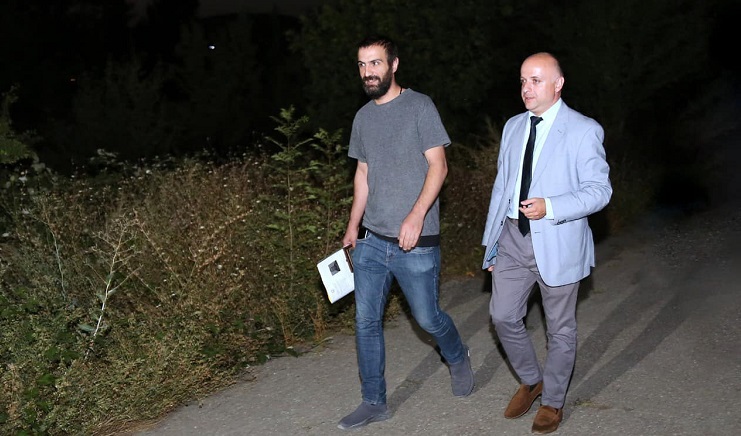Former Georgian soldier illegally arrested by Russian occupation forces released

The illegally arrested Georgian citizen Levan Machabeli (L) was transported to the Tbilisi-controlled territory on Wednesday. Photo: State Security Service press office
Levan Machabeli, a 35-year-old former Georgian servicemember who was illegally detained by the Russian occupation forces near the country's occupied Tskhinvali (South Ossetia) region in March, was released late on Wednesday, the Georgian State Security Service said.
In its comments, the agency stated the hotline mechanism and other tools at the disposal of the Georgian Government for communication with de facto authorities of the occupied region had been “actively used” in the process of releasing Machabeli, who had been accused of “illegally crossing the border” by occupation forces.
The issue of the release of Machabeli from illegal detention was regularly discussed in the format of the Incident Prevention and Response Mechanism, and the information was constantly provided to the co-chairs of the international discussions in Geneva and international partners”, said the SSS.
In its comments, the agency pledged to continue “active” work for the release of other illegally detained Georgian citizens, both in the occupied Tskhinvali and Abkhazia regions.
Video by the Georgian State Security Service.
In their previous statements, the Tskhinvali de facto security agency claimed that Machabeli, as part of the 3rd Brigade of the Georgian Armed Forces, had participated in the Russia-Georgia 2008 war in the region, and had plans to fight against Russia in the ongoing conflict in Ukraine, before his plans were thwarted by poor health.
As he was unable to leave for Ukraine to fight there, Machabeli decided to stage a provocation and cause harm to Russians stationed in Tskhinvali”, the de facto authorities said shortly after Machabeli’s arrest in April.
The illegal arrest of Georgian nationals is a common issue near the occupation line. Usually, those arrested are released once their families pay a fine.
Russia declared the independence of Georgia’s occupied Abkhazia and Tskhinvali regions on August 26, 2008, following the war.
However, only four other countries – Venezuela, Nicaragua, Nauru and Syria – have since shared Russia’s position regarding the occupied Georgian territories’ status, while the rest of the international community maintains that the regions are parts of Georgia under Russian occupation.
 Tweet
Tweet  Share
Share